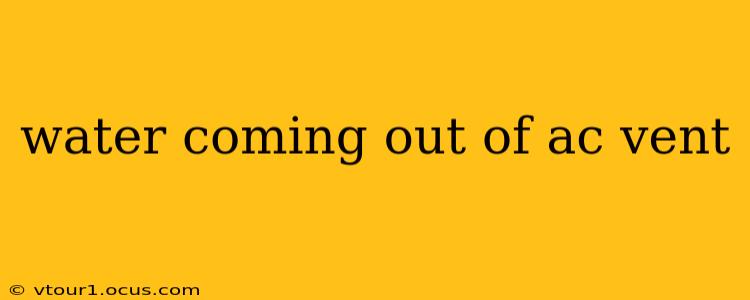Finding water leaking from your air conditioning vent is never a pleasant surprise. It can range from a minor inconvenience to a significant problem requiring professional attention. This comprehensive guide will explore the common causes of water leaking from AC vents, offer solutions for immediate fixes and long-term prevention, and help you determine when you need to call an HVAC technician.
Why is Water Coming Out of My AC Vent?
This is the most frequently asked question, and the answer depends on several factors. The source of the water can be within the air conditioning unit itself, or it can stem from problems elsewhere in your home's ventilation system or even plumbing. Let's break down the most likely culprits:
1. Clogged Condensate Drain Line:
This is the most common cause. Your air conditioner produces condensation as it cools the air. This condensation is typically drained away through a condensate drain line. If this line becomes clogged with algae, mold, or other debris, the water will back up and overflow, potentially leaking from your vents.
2. Leaky AC Unit:
A leak within the AC unit itself can result in water dripping or spraying from the vents. This could be due to a cracked refrigerant line, a faulty evaporator coil, or a failing condensate pan. These issues require professional repair.
3. Frozen Evaporator Coil:
A frozen evaporator coil restricts airflow, causing ice to melt and leak from the vents. This is often caused by insufficient airflow due to a clogged air filter, restricted airflow in the ductwork, or a malfunctioning blower motor.
4. Problems with the Condensate Pump:
Some air conditioners, especially those in basements or areas where gravity drainage isn't feasible, utilize condensate pumps. If this pump fails, water won't be removed properly, leading to leaks from the vents.
5. High Humidity:
While not directly a problem with the AC unit, excessively humid air can overload the system's capacity to remove moisture, leading to condensation that exceeds the drain line's capacity.
6. Roof Leaks:
Sometimes, water entering your home through roof leaks might find its way into the ductwork, eventually leaking out through vents. This is less common but should be investigated if the leak is persistent and isn't related to the AC unit itself.
How to Fix Water Coming from AC Vent: Immediate Solutions
While professional help might be needed for some issues, here are a few immediate steps you can take:
- Check and clean the air filter: A clogged air filter restricts airflow, leading to freezing and potential leaks. Replace or clean the filter immediately.
- Check the condensate drain line: Locate the drain line and check for clogs. You might be able to clear a minor clog using a wet/dry vacuum or a plumbing snake. Warning: Be cautious when working with drain lines; avoid damaging the line.
- Turn off the AC unit: To prevent further damage, turn off the system immediately if you notice significant water leakage.
When to Call an HVAC Technician
Don't attempt to fix complex problems yourself. Call a qualified HVAC technician if:
- You see significant water leakage.
- You suspect a problem with the refrigerant lines, evaporator coil, or condensate pump.
- You are unsure of the cause of the leak.
- The problem persists even after basic troubleshooting.
Ignoring these issues can lead to mold growth, significant water damage, and expensive repairs down the road.
Preventing Future Water Leaks from Your AC Vents
Regular maintenance is key to preventing future problems:
- Change air filters regularly: Follow the manufacturer's recommendations for filter replacement.
- Schedule annual AC maintenance: A professional technician can inspect the entire system, clean the drain line, and identify potential problems before they escalate.
- Address humidity issues: Consider using a dehumidifier, especially in humid climates, to reduce the load on your AC system.
By understanding the causes of water leaks and taking proactive steps, you can keep your air conditioning system running efficiently and prevent costly repairs. Remember, safety first! If you're unsure about any aspect of troubleshooting, contact a qualified HVAC professional.
